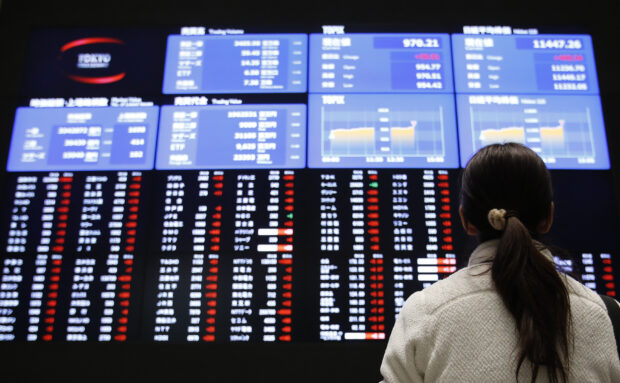
A woman looks at an electronic board showing Japan’s stock price index at the Tokyo Stock Exchange in Tokyo February 6, 2013. REUTERS/Toru Hanai/Files
SINGAPORE – Asian stocks took a breather on the last trading day of the year and are set to snap their two-year losing streak with investors buoyed by the expectations that the Federal Reserve will start cutting interest rates next year.
MSCI’s broadest index of Asia-Pacific shares outside Japan was little changed on Friday but lurked near a five month peak and was headed for a 5-percent gain in the year after two years of heavy losses.
The index is up over 11 percent in the last two months as investors ramped up bets that central banks were done raising interest rates and would soon start easing.
Markets are pricing in a 88-percent chance of the Fed starting its rate cuts in March, according to CME FedWatch tool, compared to 35 percent chance at the end of November. Traders are also pricing in over 150 basis points of easing next year.
READ: Markets outpace central banks as rate cut bets fuel ‘everything rally’
Behind the ramped-up bets is a slew of U.S. economic data that has underscored the strength in the economy as well as the likelihood of the Fed softening its stance.
The only question that the market is focused on is when and not if the central banks will cut rates, leaving ample room for disappointment in 2024.
“Goldilocks bets on soft-landing hopes emboldened by US exceptionalism and aggressive rate cut bets inspired by emphatic dis-inflation risk being wrong-footed,” said Vishnu Varathan, head of economics and strategy at Mizuho Bank in a note.
Instead, he wrote, “rate cuts are likely to be measured and gradual.”
READ: BofA sees four rate cuts from Fed next year
Best performing market in Asia
In Asia, the best performing major stock market in 2023 was Japan’s Nikkei with a gain of 28 percent, its strongest yearly performance in a decade. Taiwan’s stock market was close behind with a 26.6-percent rise in the year. India’s Nifty is the third best gainer with a 20-percent rise in 2023.
READ: Asia shares at five-month highs as rate bets pile up
Thailand’s SET index on the other hand was the worst performing stock market in Asia this year with a decline of 15 percent. Hong Kong’s Hang Seng Index headed for a 14-percent decline this year, making it the second weakest performer. China’s blue-chip stocks was on course for an 11-percent decline for the year.
Futures indicate European bourses are likely to have a subdued end to the year as traders consolidate their positions.
The pan-European STOXX 600 has had a blistering end to the year and is up 11 percent in the past two months and is hovering around its 23 month peak.
Overnight, the S&P 500 ended Thursday’s session just 0.3 percent shy of its record closing high, reached on Jan. 3, 2022.
Global bonds rally
The global bonds rally has continued, leading yields lower, after being battered for the most part of the past two years as interest rates rose. The 10-year U.S. Treasury yield was at 3.8387 percent, having briefly touched 3.820 percent, its lowest since July 19 on Thursday.
In the currency market, the dollar was rooted on the back foot and headed for a 2-percent decline this year after two years of strong gains, driven by first the anticipation of and then the actual hiking of rates by the Fed to battle inflation.
Against a basket of currencies, the dollar was last at 101.50, edging away from the five month low of 100.61 it touched on Wednesday.
READ: Dollar snaps two-year winning streak on 2024 rate cut bets
While the dollar’s weakness is likely to continue next year, especially if the Fed comes through with rate cuts early 2024, the strength of the U.S. economy could limit its decline.
In commodities, Chicago wheat and corn futures were set for biggest annual drop in a decade as easing supply bottlenecks in the Black Sea region and higher production added pressure on prices.
Meanwhile, cocoa prices surged to multi-decade highs in 2023, while iron ore jumped 50 percent.
Oil prices were due to end the year 10 percent lower as geopolitical concerns, production cuts and global measures to rein in inflation triggered wild fluctuations in prices.
On Friday, U.S. crude rose 0.24 percent to $71.94 per barrel and Brent was at $77.41, up 0.34 percent.
Gold prices rose on Friday and were poised to end their best year in three. Spot gold added 0.2 percent to $2,068.86 an ounce.